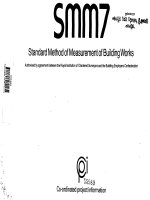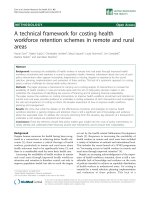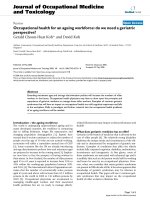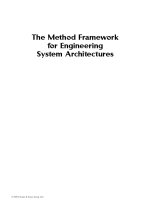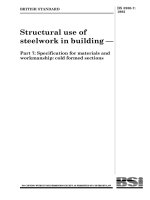METHOD STATEMENT FOR UNDERGROUND PLUMBING WORK
Bạn đang xem bản rút gọn của tài liệu. Xem và tải ngay bản đầy đủ của tài liệu tại đây (1.16 MB, 20 trang )
Comment Response Sheet (CRS)
Project Title
Van Phong 1 BOT Thermal Power Plant Project
Document Title
METHOD STATEMENT FOR UNDERGROUND
PLUMBING WORK
Document Type
For Approval
Document No
VP1-0-L4-A-UYX-20023
Returned Status
AC
Prepared by
CRS No
VP1-0-L4-A-UYX-20023-A-CRS
CRS Issued Date
16/06/2020
Engineer
No.
1
2
Section/
Page
3
3
Owner’s Comment
Response to Comment
16/06/2020
Please clearly state the extent this system
includes - potable water supply, sanitary
drainage, waste drainage, chemical drainage, etc.
drainage as applicable.
[Rev.B]
16/06/2020
Provide reference documents of piping material
specification.
[Rev.B]
Review
Date
Status O/C *
16/06/2020
O
This method statement includes - potable water
supply, sanitary drainage, waste drainage,
chemical drainage, etc.
This MS is related with procedure of
underground plumbing work, and approval for
plumbing material is being submitted separately.
MS KIM
Remarks
C
16/06/2020
O reference drawing
Complete
number to close out this comment.
- uPVC: VP1-0-L4-Q-GEN-10040
- cPVC: VP1-0-L4-Q-GEN-10049
- Carbon steel: VP1-0-L4-Q-GEN-10061
- Stainless steel: To be submitted
Page 1 of 4
Comment Response Sheet (CRS)
3
3
16/06/2020
Lists all drawing number under reference drawing
list for clarity of applicability of this document.
[Rev.B]
16/06/2020
Since plumbing drawings are submitted for each
building, it is difficult to indicate the drawing
numbers of all buildings. Hence, turbine building
and CCB drawing for underground plumbing
work were issued as mentioned below;
O
Noted. Closed
- VP1-C-L4-C-UMA-29601, D (Turbine)
- VP1-0-L4-A-UCB-02401~4, B (CCB)
4
5
3
3
16/06/2020
Only plastics pipes? No SS, etc. underground
pipes for plumbing system? Please clarify
[Rev.B]
16/06/2020
Typical drawings, P&ID, isometric drawings, and/
or schematic drawings should be given as
reference.
[Rev.B]
16/06/2020
O
C
The table has been updated
16/06/2020
O
C
16/06/2020
O
C
16/06/2020
O
Please refer to the submitted plumbing drawings.
- VP1-C-L4-C-UMA-29601, D (Turbine)
- VP1-0-L4-A-UCB-02401~4, B (CCB)
6
3
16/06/2020
Relevant project specification to be list as
reference.
[Rev.B]
- Part III-2 Exhibit B1 Appendix G - Civil
Structural Technical
- Part III-2 Exhibit B1 Tech Spec Section 8
7
4
16/06/2020
Who? CTCI or Doosan or VPCL? Please review
and clarify
[Rev.B]
All materials required should be approved by the
VPCL (and Poyry) who is Owner of Van phong-1
project.
C
Page 2 of 4
Comment Response Sheet (CRS)
8
9
10
11
12
13
14
4
4
5
5
5
5
5
16/06/2020
Consider material is PVC pipe, recommend to
apply sand bedding and backfill around the pipe to
avoid pipe damage.
[Rev.B]
16/06/2020
Provide typical of trench section, that shown
typical dimension, and depth of trench, bedding,
embedment, and cover according to designed
compressed load on top of pipe.
[Rev.B]
16/06/2020
Why raw water is allow to used? It is possible to
contaminate in potable water?
[Rev.B]
16/06/2020
ITP specify 2 hrs. Which is correct?
[Rev.B]
16/06/2020
Is this leak test done before or after back-fill?
Describe more to repair method in this document.
[Rev.B]
16/06/2020
Indicate test pressure.
[Rev.B]
16/06/2020
Provide with project document numbering. This
document should be conformed to design
standards/ local regulation.
[Rev.B]
16/06/2020
OClosed
16/06/2020
O
C
16/06/2020
CO
16/06/2020
C
O
16/06/2020
O
C
Sand bedding and manual backfill around the
pipe to be applied.
Typical section to be updated as per comment.
But It will be changed depending on pipe size or
site condition.
Test medium shall be used by potable water only
It is revised to 02 hrs.
After the leak test done shall be backfill
16/06/2020
Design requirement for test pressure of Portable
water supply line in building is 4bar.
This pressure test is to check whether the pipe is
leaked, and is conducted according to the design
required pressure and code.
16/06/2020
Hydrostatic test pressure shall be
O to ASME B31.1. Please
complied
recheck and confirm.
ClarifyOtest pressure
according to design
pressure.
Page 3 of 4
Comment Response Sheet (CRS)
15
16
17
18
19
5
7
7
9
10
16/06/2020
Calibration certificated should be attached with
the test record.
[Rev.B]
16/06/2020
Describe more about method to remove
foreign matter inside of piping.
[Rev.B]
16/06/2020
Gravity-slope line shall be lay on sleeper and fixed
to ground at design level
[Rev.B]
16/06/2020
Test pressure shall be 1.5 design pressure
according to 137.4.5 ASME B31.1
[Rev.B]
16/06/2020
ITP document L4-A-UYX-20024 Rev A doesn't
match with this document. Please review and
correct these documents/ any orher EPC
document (if applicable) to avoid any possible
mismatch.
Additional Notes (if any)
* O - Open, C – Closed
16/06/2020
O
C
16/06/2020
O
C
Calibration certificated will be attached with the
test record.
Revised as per comment
16/06/2020
Closed
O
Revised as per comment
16/06/2020
Closed
O
Revised as per comment
[Rev.B]
16/06/2020
O
MS and ITP have revised and submitted
C
Page 4 of 4
AP
APPROVED
Approved
AC
APPROVED WITH COMMENT
Contractor to revise the correction and resubmit
NA
NOT APPROVED
Revise the correction and resubmit before proceeding
REVIEWED
RE
REVIEWED WITH COMMENT
RC
For Approval
Information acknowledged with no comment
Information acknowledged with comments
Note: Approval or comment does not relieve the Contractor of
all obligations covered under contract
Discipline:
Date:
Mechanical / Architectural
14 Jul 20
B
02-Jul-2020
For Approval
J.H CHOI
K.S KIM
M.S KIM
A
04-Jun-2020
For Approval
J.H CHOI
K.S KIM
M.S KIM
REV
DATE
DESCRIPTION
Approved
Checked
Prepared
OWNER
VAN PHONG POWER COMPANY LIMITED
PROJECT
Van Phong 1 BOT Thermal Power Plant Project
Status
□Approved
□Approved with Comment
□Not Approved
□Reviewed
OWNER’S ENGINEER
Pöyry Switzerland Ltd.
EPC CONTRACTORS
IHI–TESSC–CTCI–DHI CONSORTIUM
PROJECT DOCUMENT No
REV
VP1-0-L4-A-UYX-20023
B
DOCUMENT TITLE
METHOD STATEMENT FOR UNDERGROUND PLUMBING WORK
EPC
EPC DOCUMENT No.
VP1-0-L4-A-UYX-20023
Doosan Heavy Industries and Construction
REV
B
Page | 1
METHOD STATEMENT FOR
UNDERGROUND PLUMBING WORK
TABLE OF CONTENTS
1. PURPOSE.............................................................................................................................3
2. MACHINERY & EQUIPMENT........................................................................................3
3. RESPONSIBILITIES..........................................................................................................4
4. MATERIALS.......................................................................................................................4
5. PROCEDURE & SEQUENCE...........................................................................................4
6. WORK METHOD/PROCEDURE.....................................................................................7
7. QUALITY CONTROL......................................................................................................11
8. ENVIRONMENT, HEALTH AND SAFETY (EHS)......................................................11
Page | 2
METHOD STATEMENT FOR
UNDERGROUND PLUMBING WORK
1.0 PURPOSE
The purpose of this Method Statement is to describe the methodology involved on the installation of
B
underground plumbing work such as potable water supply, sanitary drainage, waste drainage, chemical
drainage, oily drainage as per plumbing drawing limited in building. the steps to be taken in meeting the
technical standards and EHS requirements of Van Phong 1 BOT Thermal Power Plant.
Plant Project/Project:
Van Phong 1 BOT Thermal Power Plant Project
Company/Owner:
Van Phong Power Company Limited (VPCL)
Contractor:
EPC
Reference document:
- TCVN 4519:1988 Indoor water supply and drainage systems - Codes for construction, check and
acceptance
- Project technical requirement
- Approval civil construction drawing
Reference drawing list for clarity of applicability of this document:
B
+ VP1-C-L4-C-UMA-29601, D (Turbine)
+ VP1-0-L4-A-UCB-02401~4, B (CCB)
2.0 MACHINERY & EQUIPMENT
No.
B
Description
Remark
Clamping tool & hand tools : measuring and leveling tools,
1
glue roller, knives, scissors, screw driver, plumbs
2
Required machine for joint: Cutting machine, welding machine,
Sander, (if required as per manufacture recommend)
3
Consumables : Pipes and fittings, duct tape
4
Hydrostatic Test equipment
Portable water line only
Page | 3
METHOD STATEMENT FOR
UNDERGROUND PLUMBING WORK
3.0 RESPONSIBILITIES
It is overall responsibility of Project Manager to organize resources prior to perform construction
activities as per project specification in compliance with the quality, schedule & safety requirements.
EHS Manager will ensure in coordination with Site Engineer that all measure/construction taken shall
be maintained till completion of job.
It is the responsibility of Construction Manager/Site Engineer that construction activities are executed
according to the relevant project specification in compliance with the quality, schedule & safety
requirements.
EPC will ensure that all works are performed safely.
The relevant EPC Supervisor will ensure that the work is carried out in accordance with this method
statement and project specification.
The QC Inspector will ensure that the work is executed according to the requirements of quality dossier
are fulfilled.
4.0 MATERIAL
B
Please change to "or VPCL's
representative".
All materials required shall be approved by the VPCL (and Poyry) who is Owner of Van Phong 1
project.
All materials required shall be true to size, without cracks, chips, splits, or other defects which may
impair their strength or durability.
Material should be taken receiving inspection with all their certificate from factory approved
5.0 PROCEDURE AND SEQUENCE
5.1 The Contractor shall furnish all labor, tools and materials necessary for the complete installation of
the plumbing system which includes pipe lines inside(including under) Buildings
5.2 Underground Soil, Waste, Drain and Vent Pipe and Fittings - Underground soil, waste, drain and
vent pipe and fittings shall be uPVC; CPVC pipe.
5.3 Under slab sanitary sewer pipes from fixtures to the building main shall be uPVC pipe. Fittings shall
be uPVC and solvent weld shall comply ASTM D2564 solvent cement (or product of manufacture).
5.4 Potable water pipe and fittings shall be stainless steel complied with ASTM A312-TP304.
5.5 All excavation shall be restored to its required level. The bottom of trench shall be dry prior to
B
installation. After installation, all pipe ends shall be capped to prevent egress of unsuitable materials.
Sand bedding and manual backfill around the pipe to be applied to avoid pipe damage.
Page | 4
METHOD STATEMENT FOR
UNDERGROUND PLUMBING WORK
5.6 The trench bottom shall be continuous, smooth, free of rocks and in accordance to the line and grade
shown in the drawing.
B
Typical section of trench shall be changed depending on pipe size or site condition as below:
Typical section of installation pipe
5.7 Testing:
Service Test for Gravity-Slope line
• Gravity (Sanitary drain, Sewage drain, and chemical drain, Oily drain) drainage system shall be
subjected to service test.
• Service Test Inspection shall be conducted after complete backfilling has been done for installed
gravity-slope drainage line.
• Service test shall be done prior to concrete works to ensure no leakage on installed gravity-slope
underground piping cause by excavation damage or by any other causes.
B
• Water level in pipe shall be checked for confirmation of water leakage during test 2hr.
• After the leak test done shall be backfilled.
• Test medium shall be used by potable water or raw water.
Hydrostatic test for Portable water line
• Pressure (Portable water line, Water supply, Hot water line) system shall be subjected to hydrostatic
test in accordance with Doosan Quality and Safety Management Plan.
B
• Test medium shall be used by potable water only.
Page | 5
METHOD STATEMENT FOR
UNDERGROUND PLUMBING WORK
• Lines whose joints have not been backfilled for underground piping or are above ground piping shall
be tested to a period of 1 hours while 2 hours shall be maintained for lines whose joints have been
backfilled or concealed.
B
Is it potable water?
• Test Limits, pressure, test medium and safety requirements shall be identified. Design requirement
for test pressure of Portable water supply line in building is 4bar.
• Temporary supports shall be installed wherever required.
Regarding VP1-0-L3-R-GKB-22001 rev D,
potable water pumps head is 55.97 m. Please
ensure that test pressure is sufficient and complied to ASME B31.1.
• All joints shall be left exposed for visual inspection during test.
• Underground piping shall be partially backfilled with all joints exposed to serve as a pipe support
and prevent floatation.
• Work Permit is obtained for all pressure testing and associated work within restricted areas, Work
Permit System.
• The test areas shall be marked and warning signs shall be posted to alert approaching personnel.
• A blow down valve of adequate pressure rating is installed to depressurize the system.
• The relief valve shall be located in the test manifold near the test pump.
• A pressure gauge shall be located at the test manifold and one pressure gauge on the furthest route of
B
the piping network being tested. Calibration certificated will be attached with the test record.
• Vents shall be provided at all high points in the system being tested.
• A blow down valve or bleed valve shall be readily accessible in case immediate depressurization is
required.
Hydro test Crew
• Hydrostatic Testing shall be done by trained personnel in the proper handling and usage of
applicable tools and equipment prior to start of hydrostatic Testing.
• Personnel conducting the hydrostatic testing shall be fully aware of the general requirements of safe
pressure testing of pipelines.
Pressurization
• No Thermoplastic Piping shall be pressurized until it has cured for 24 hours at a surface temperature
of 10°C or higher.
• The test pump & test manifold shall be placed on a firm ground away from the piping being tested.
• The test manifold shall be supported firmly to avoid vibration during pressurization.
• All in line valves are in open position.
Page | 6
METHOD STATEMENT FOR
UNDERGROUND PLUMBING WORK
• Filling and pressurization is injected at the test manifold upstream of check valves and at the lowest
point of the system being tested to minimize entrapped air.
• Water filling into the system shall be direct from a water truck or form a ground level water tank
with pump.
• Remove air during filling of water by opening the vents installed at high points and shall be closed
when air has been released from the system.
• After venting, valves used for venting are placed at partial open position and plugged.
• Vents and drains used only for the pressure test shall be plugged or seal welded.
• To pressurize the system, motorized or manual test pumps shall be used depending on the size of the
system being tested.
• The system shall be pressurized slowly.
• Preliminary check for leaks at 50% of the test pressure shall be done.
• The pressure is increased in steps no greater than one-fifth of the test pressure after the preliminary
check at 50% test pressure. Each step in pressurization is held at minimum of 10 minutes.
• After the test pressure is reached (before inspection), the isolation valve between the test manifold &
the piping system under pressure test is closed and the test pump disconnected.
• No repair of leaking joints until the system has been de-pressurized.
Depressurization and Draining of Test Medium
• After pressure testing has been successfully completed and approved, the piping system being tested
shall be depressurized and drained.
• Release of pressure and draining shall be done on the downstream side of check valves.
• All vents shall be opened before draining to facilitate drainage and to prevent formation of a vacuum.
• Water used for hydrostatic testing can be used for another test, to be used for water spray of trenches,
to be used for water flooding of pipe sand covering or to a safe and approved discharge area.
• All temporary items installed for testing purposes shall be removed.
• All pipe ends shall be covered after draining the system to prevent entry of foreign materials into the
system.
6.0 WORKING METHOD/PROCEDURES
B
6.1 Check the protection cover of both ends of the pipe and remove any dust that may remain in the
piping with water and brush before installation.
Page | 7
METHOD STATEMENT FOR
UNDERGROUND PLUMBING WORK
6.2 Adequately support vertical lines at their bases or by a suitable hanger place in horizontal line near
riser or by a base fitting set on pedestal.
6.3 Run piping in straight lines and square with the building. Gravity-slope line shall be lay on the sand
B
bedding as shown clause 5.6 above and fixed to ground at design level. Riser lines to be plumb. Provide
dielectric fittings for connecting dissimilar metals.
6.4 Do not route piping over any electrical equipment where the possibility of damage exists. Provide
flanges and unions throughout piping system to facilitate the installation and removal of piping and
equipment.
6.5 Sewer lines shall not cross over water line. In case inevitable, suitable measures at the crossing shall
be taken.
6.6 Valves shall be installed in horizontal lines with stems either horizontal or vertical. Isolation valves
shall be installed at any other points indicated or required for draining, isolation, or sectionalizing
purposes as per Drawings. Valves shall be installed such that maintenance access is maintained for all
parts requiring service. Control valves shall be provided in water pipes to provide complete regulation
of plumbing fixtures and equipment.
6.7 Provisions must be included for servicing and removal of equipment without dismantling piping
works. Place sanitary sewer pipe, drain pipe and chemical pipe, oily pipe at elevation and slopes as per
drawing.
6.8 Preparation for the first fix shall commenced immediately upon completion of civil works.
6.9 Marking for the pipe route considering the other agencies shall be done with due consideration for
slopes and tapping points as per the drawings.
6.10 After the chasing works, the pipes shall be concealed
6.11 The process of installing pipelines shall be inspected by the stakeholders and ensured to follow the
required procedures. (There will be no leak if the installation process follows the right procedures).
Visual leak check shall be carried-out after the installation. The visual leak test result shall be provided
in the ITP during inspection process.
The leak test shall be applied with drainage pipe line. With pressure pipe line such as portable water
line and hot water line will be applied to hydrostatic test.
Page | 8
METHOD STATEMENT FOR
UNDERGROUND PLUMBING WORK
Pressure test work flow chart:
Preparation
Filling and Venting
Testing & Pressurizing
Draining
Preparation work
-
* Document
The test section of the line has been installed in accordance with drawing
The location marking of the test on the DWG.
All equipment / Instruments shall have a valid calibration certification and shall be recalibrated befor
e due date, method statement shall be follow for calibration of Equipment/Instruments.
* Equipment
-
Pressure water pump
Calibrated pressure gauges
Blind flanges with bolts/nuts and temporary gaskets.
Valves and pipes for connection with gauges and the pump, safety valves
Safety tapes, warning signs etc.
Consumables
Hand tools
Test water should be using potable fresh water (Design flow water) or equivalent
Filling and Venting
-
Ensure suitable pumps are available for filling of the system and its pressurization. The specification
of pumps to be used shall be provided before testing
Liquid testing medium will be filled from the lowest point in the system to minimize the risk of trapp
ed air pockets
Vent shall be open to remove all air during supply of the water
Testing and Pressurizing
-
Test pressure gauge shall be fixed in the highest elevation of the pipe line, and pressure gauge shall b
e have valid calibration certificate
Hydro test for underground, the section pipe line to be tested should be partially backfilled
including pipe to fitting joints to ensure a proper support. Check point to be exposed for inspection d
uring the test
Page | 9
METHOD STATEMENT FOR
UNDERGROUND PLUMBING WORK
B
-
The hydrostatic test pressure test shall be 1.5 times the design pressure (according to 137.4.5 ASME
B31.1).
The increase of pressure won’t be higher than 1 bar every 10 minutes for ND > 500 mm and 1 bar ev
ery 5 minutes for ND < 500 mm
Pressurizing - Initial Expansion Phase - Add make-up water as necessary to maintain maximum test
pressure for 4 h
Test Phase - Reduce test pressure by 10 psi (1.45 kPa) and monitor pressure for 1 h. Do not increase
pressure or add make-up water.
If leakage are found, the locations shall be marked, the pressure shall be gradually released, and the p
iping shall be drained or vented. Appropriate repair or replacement shall be made. The affected pipin
g shall be re-tested at the pressures originally specified for the test.
*Acceptance Criteria
-
If no visual leakage is observe and pressure during the test phase remains steady (within 5% of the te
st phase pressure) for 1 hour, the test is acceptable.
Draining
-
After successful completion of the test, the system shall be depressurized gradually and then drain co
mpletely. Pressure shall be released in a control manner and at a rate so as not to endanger personnel
or damage equipment.
Testing diagram
Arrangement tools drawing for hydro test
Page | 10
METHOD STATEMENT FOR
UNDERGROUND PLUMBING WORK
6.12 Pipes shall be joint when the length of a pipe has been put into use, and in case in case that there
are changes on the elevation and direction of the pipeline in accordance with the design, joint fittings
shall be needed.
6.13 Checking the slope of pipes following the design: Before installing pipes in the concrete structure
or associated with other structures, the elevation (pipe bottom) shall be determined by the theodolite and
supporting frames shall be reinforced by round steel. For the pipelines on the ground, the elevation shall
be determined by the theodolite and the land area is prepared following the design elevation, then pipes
shall be directly installed on the prepared ground. After the pipe installation, checking the slope again
by the theodolite and tape measure.
6.14 The bottom of pipe and back fill material shall not have any sharp edged material which may
damage the pipes. Hence generally, the bottom 100mm shall be filled with sand and also back filling
shall be done with sand till 100mm above the pipe to ensure no damage to pipe and to consolidate
properly without applying excessive loading. We using sand backfilling materials for this work.
7.0 QUALITY CONTROL
The Site Inspection and Test Plan (ITP) for this work summarize various characteristics to be
checked. The concerned Site Engineer/Foreman will be responsible to ensure stage wise
compliance for these operations and the Site QA/QC Engineer/Inspector will carry-out quality
control checks and report the inspection results.
8.0 ENVIRONMENT, HEALTH AND SAFETY (EHS)
8.1 Responsibilities and Instructions
8.1.1 EHS Officer shall ensure that all work is undertaken in accordance with the specified work
scope.
8.1.2 Safety training should be conducted to all personnel assigned at site prior to commence any
work.
8.1.3 All personnel should know the locations of fire extinguishers, communications, manual alarms
& ESD points.
8.1.4 All personnel should be aware of assembly points, escape routes, emergency contact numbers.
8.1.5 Personal Protective Equipment (PPE) shall be worn at all times.
8.1.6 Good housekeeping shall be observed in work areas.
8.1.7 Construction wastes shall be segregated and disposed to an approved dump yard area.
8.1.8 Keep non-essential workers clear of machinery whilst it is in operation.
Page | 11
METHOD STATEMENT FOR
UNDERGROUND PLUMBING WORK
8.1.9 Proper inspection of all equipment prior to use to avoid leakage and equipment failure.
8.1.10 Permit to work shall be obtained appropriately for the type of work and location.
8.1.11 All vehicles must comply to observed speed limit of 10km/h on site.
8.1.12 Excavation and delivery of materials are prohibited during heavy rains.
8.1.13 Adequate lighting equipment when working night time.
8.1.14 Ensure all workers and equipment working overtime are properly accounted and obtained.
Regular working time is from 7:00am ~ 5:00pm.
8.1.15 Periodic refresher trainings, tool box talk and audit shall be conducted.
8.2 Safety (PPE)
8.2.1 Personal Protective Equipment (PPE) will be issued to all workers such as safety shoes, hard hat,
working gloves, earplug, safety goggles, reflective vest and safety harness for workers who will be
assigned in elevated places 1.6m and above.
8.2.2 Wearing of the basic PPE will be enforced fully.
8.2.3 All new recruits will undergo proper orientation and safety induction before they could have
deployed at site for work.
Page | 12
JOB SAFETY ANALYSIS
Van Phong 1 BOT Thermal Power Plant Project
8.3 Job Safety Analysis:
List of All Job Steps
List of All Known Hazards
How to Eliminate Hazards
A.1a Be operated only by workers who have been
authorized and given appropriate training
A.1b Safe operating procedure should be
established and used for all tools and equipment
A.1c Daily checklist of equipment must be
A.1 Injury by using hand tools
and both manual and power
driven.
A.Equipment/Too
ls and Material
Preparation
provided prior to stat any work.
A.1d Every power driven tools should be
provided with adequate means, immediately
accessible and readily identifiable by operator, of
stopping it quickly and preventing it from being
started again inadvertently.
A.1e Every hand tools must be inspected every
month and attached inspection tag
A.2 Electric shock due to
without ground external box
and circuit breakers
A.2a Provide adequate ground and circuit
breakers
A.2b Must use 3 core codes electric wire and
separate distribution panel (must pass
arrangement of ELCB) and avoid any water
affect.
A.2c All kind of electric cable must be hang over
ground
A.2d Must use industrial socket and plug
A.2e Electric cabinet don't affect any water
B.1a Undetermined periods the workers should
get proper fresh air
B. During the
Course of Piping
Works
B.1 Inhalation of piping works
B.1b Clear drinking water to be taken to clear the
Throat and blow nose to remove dust.
B.1c All necessary PPE to be provided.
Page | 13
JOB SAFETY ANALYSIS
Van Phong 1 BOT Thermal Power Plant Project
List of All Job Steps
List of All Known Hazards
How to Eliminate Hazards
B.2a Workers should be provided with proper
interval whilst using cutting machine
B.2b All necessary PPE to be provided
B.2c Close supervision and monitoring to be done
B.2 Cutting Machine
B.2d Fire extinguisher equipment shall be
sufficient to Extinguish all types of fire likely to
be encountered.
B.2e All extinguishers shall be readily accessible,
free from construction and their locations clearly
marked by Adequate signs.
B.3 Eye contact
B.3a Irrigate eye with plenty of water and seek
Medical attention if symptoms persist.
B.3b All necessary PPE to be provided
B.4a All LPG cylinders to be approved by
Government Authority.
B.4 Fire
B.4b Proper fire arrestor to be fixed with the
cylinder
B.4c Fire extinguisher equipment shall be
sufficient to extinguish all types of fire likely to be
encountered
B.4d All extinguishers shall be readily accessible,
free from construction and their locations clearly
marked by Adequate signs.
B.4e Chemical shall be stored in secondary
containment & MSDS requirement shall be
communicated with all concerned
C. Installation of
Pipe
C.1 Injury could be caused
whilst off loading & shifting
the materials
C.1a Material shall be properly off loaded and
stacked at the location required
C.2 Collapse of scaffolding due
to overweight
C.2a Use appropriate scaffold materials only.
Page | 14
JOB SAFETY ANALYSIS
Van Phong 1 BOT Thermal Power Plant Project
List of All Job Steps
List of All Known Hazards
C.3 While application at higher
elevations
How to Eliminate Hazards
C.3a Use safe working platform with toe boards
C.3b No person will be allowed to work directly
under whist this activity is on progress
C.3c All necessary PPE to be provided
C.4a Cordon off the area below.
C.4 Splashing of chemicals into
the eyes whilst application
C.5 Fire handling and storage of
materials
C.4b Wear proper PPE including eye protection
C.5a Fire extinguisher equipment shall be
sufficient to Extinguish all types of fire likely to
be encountered.
C.5b All extinguishers shall be readily accessible,
free from construction and their locations clearly
marked by adequate signs.
C.5c Chemical shall be stored in secondary
containment & MSDS requirement shall be
communicated with all concerned
D. Working
Operation During
Night Time
D.1 Working operation may
cause injury to personnel due to
poor visibility of the area
D.1a Must provide sufficient lightings on the
entire working area
D.1b All equipments/tools must be fitted with
appropriate safety device and ensure all lights are
operational not obscured by dirt & mud
D.1c Supervisor and safety personnel must always
be present for the entire working operation.
D.1d All workers must be wearing reflective vest
D.1e Must use and connect 3 core codes electric
wires with separate distribution panel (must pass
arrangement of ECLB).
Page | 15
JOB SAFETY ANALYSIS
Van Phong 1 BOT Thermal Power Plant Project
List of All Job Steps
List of All Known Hazards
How to Eliminate Hazards
D.2a Daily check of the equipments prior to start
of work.
D.2 Generator (Diesel)
equipment oil leakage during
operation.
D.2b Regular check &monitoring of the
equipment prior to use.
D.2c Provide secondary containment protection
under the equipment to prevent contamination of
soil by oil spillage
D.3 Oil/chemical storage
D.3a Diesel/chemical shall be stored in secondary
containment & MSDS requirement shall be
communicated with all concerned
Page | 16
